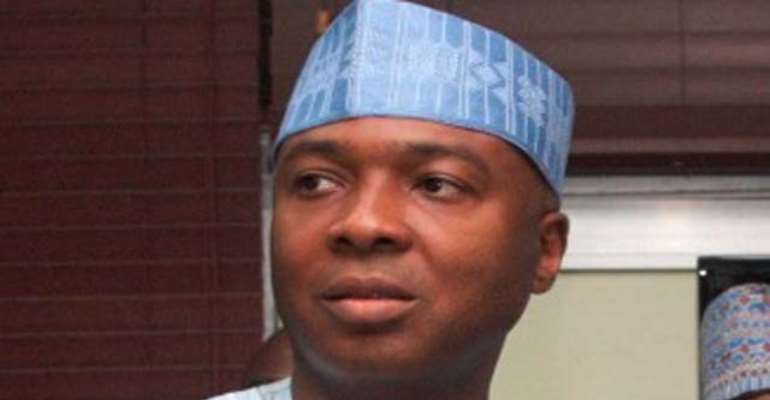EFCC quizzes Saraki over alleged frauds

The Economic and Financial Crimes Commission on Monday quizzed a former Kwara State Governor, Bukola Saraki.
Saraki, a serving senator representing Kwara Central senatorial district interrogated by operatives of the Economic and Financial Crimes Commission (EFCC) over his role in the collapse of the defunct Societe Generale Bank of Nigeria (SGBN) and governor of Kwara State.
Saraki was a director of the bank prior to his election as governor of Kwara State in 2003.
The former governor, who was still in custody of the anti-graft agency as the time of filing this report, reportedly interrogated by detectives led by an Assistant Commissioner of Police, Ibrahim Magu.
He also faced another panel of interrogators led by a Deputy Superintendent of Police, Yahaya Bello.
It was learnt that the Bello-led team grilled the Senator over the control and management of state funds during his eight-year reign as a governor.
Bello is the second in command in charge of economic governance at the EFCC.
Sources had confirmed that the EFCC did not intend to keep the former governor in its custody overnight, as it was confirmed that he was granted administrative bail and asked to report to the commission on Tuesday.
Spokesman of the EFCC, Mr Wilson Uwujaren, who confirmed the development in a chat, said the former chairman of the Nigeria Governors Forum (NGF) was being interrogated over his activities while he served as a director of SGBN and some issues that had to do with his activities as governor of Kwara State.
Saraki, who drove into the office of the commission to honour an earlier invitation, was interrogated by a team of operatives.
'Yes, he came to the office today and he was being interrogated. He was being questioned on issues relating to his activities as a director of the defunct SGBN and also as governor of Kwara state,' Uwajuren said.
Last week, information had it that operatives of the EFCC were on the trail of the former governor, who was on his way to Saudi Arabia.
The senator, however, chose to report to the EFCC on his return to Nigeria.
According to a source in the commission, the eight-year governorship of Saraki, during which several billions of naira allegedly disappeared into private pocket is the fulcrum of the investigation against him.
The EFCC spokesman, Wilson Uwujaren, confirmed that Saraki was with the commission but declined comments on the reasons for his visit.
He said, 'Yes, he is with us but I cannot say more than that.'
The Central Bank of Nigeria withdrew the SGBN operational licence in 2005 following its inability to increase its capital base to N25bn.
However, the bank got back its licence in 2010 following a court's judgment nullifying the action of the CBN.
Saraki on August 1, in a statement by his media aide, Bamikole Omisore, denied that the anti-graft agency invited him for interrogation.
The statement read, 'We will like to emphasise and categorically state that Senator Abubakar Bukola Saraki has not received any letter of invitation from the EFCC.
'For the avoidance of doubt, those, who have been a keen observer of this unfolding drama, will recall that the agency has conducted an investigation in 2010, 2011 and 2012 without finding the Senator wanting.
'These are not new issues and Senator Saraki has stated that if he receives an invitation from the agency to assist them in their findings, he will be more than happy to honour the invitation as he has nothing to hide, with regard to his tenure as a governor.'
The statement added, 'As regards the SGBN, again, this is not new as investigation on this was done over 10 years ago and during the investigations, Senator Saraki, as the governor of Kwara State, waived his immunity to answer questions by the EFCC officials in Lagos as regard his time at the bank.
'To set the record straight, there has been no invitation notice to the Senator prior to the newspaper publication even as of the time of preparing this press statement, there is still no invitation from the EFCC. These are facts that can be easily correlated.'
